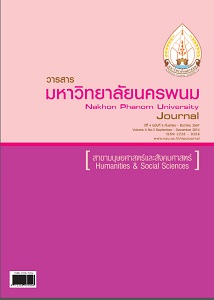การเปรียบเทียบผลสัมฤทธิ์ทางการเรียน ทักษะการคิดวิเคราะห์ และความฉลาดเชิงจริยธรรม เรื่องสำนวนไทย ชั้นประถมศึกษาปีที่ 4 ระหว่างการจัดกิจกรรมด้วย กลุ่มร่วมมือแบบ STAD กับแบบปัญหาเป็นฐาน (PBL)
Main Article Content
Abstract
การวิจัยครั้งนี้มีวัตถุประสงค์เพื่อ 1) หาประสิทธิภาพของแผนการจัดกิจกรรมการเรียนรู้ด้วยกลุ่มร่วมมือแบบ STAD กับการจัด กิจกรรมการเรียนรู้แบบปัญหาเป็นฐาน (PBL) ให้มีประสิทธิภาพตามเกณฑ์ 80/80 2) หาค่าดัชนีประสิทธิผลของการจัดกิจกรรม การเรียนรู้ ระหว่างการจัดกิจกรรมการเรียนรู้ ทั้ง 2 รูปแบบ 3) เปรียบเทียบผลสัมฤทธิ์ทางการเรียนระหว่างการจัดกิจกรรมการเรียนรู้ ทั้ง 2 รูปแบบ 4) เปรียบเทียบทักษะการคิดวิเคราะห์ ระหว่างการจัดกิจกรรมการเรียนรู้ทั้ง 2 รูปแบบ 5) เปรียบเทียบความฉลาดเชิง จริยธรรม ระหว่างการจัดกิจกรรมการเรียนรู้ ทั้ง 2 รูปแบบกลุ่มตัวอย่างในการวิจัย ได้แก่ นักเรียนชั้นประถมศึกษาปีที่ 4 โรงเรียน อนุบาลนครพนม สำนักงานเขตพื้นที่การศึกษาประถมศึกษานครพนม เขต 1 ปีการศึกษา 2555 จำนวน 2 ห้องเรียน รวม 80 คน ซึ่งได้ มาโดยการสุ่มแบบกลุ่ม เครื่องมือที่ใช้ในการวิจัยประกอบด้วย แผนการจัดกิจกรรมการเรียนรู้ด้วยกลุ่มร่วมมือแบบ STAD และ การจัดการเรียนรู้แบบปัญหาเป็นฐาน (PBL) รูปแบบละ 8 แผน โดยใช้ทั้งสิ้น 16 ชั่วโมง ต่อรูปแบบ แบบทดสอบผลสัมฤทธิ์ทาง การเรียน ชนิด 4 ตัวเลือก จำนวน 40 ข้อ มีค่าความยาก ระหว่าง 0.29–0.80 ค่าอำนาจจำแนกระหว่าง 0.23-0.78 ค่าความเชื่อมั่น เท่ากับ 0.76 แบบวัดทักษะการคิดวิเคราะห์ ชนิด 4 ตัวเลือก จำนวน 20 ข้อ มีค่าความยากระหว่าง 0.23–0.77 ค่าอำนาจจำแนก ระหว่าง 0.28-0.72 ค่าความเชื่อมั่น เท่ากับ 0.86 แบบทดสอบความฉลาดเชิงจริยธรรม ชนิด 3 ตัวเลือก จำนวน 20 ข้อ มีค่าอำนาจ จำแนกระหว่าง 0.24–0.79 ค่าความเชื่อมั่น เท่ากับ 0.75 สถิติที่ใช้ในการวิเคราะห์ข้อมูล ได้แก่ ร้อยละ ค่าเฉลี่ย ค่าเบี่ยงเบนมาตรฐาน และการทดสอบสมมติฐานใช้ t-test (Independent) ผลการวิจัยพบว่า 1) การจัดกิจกรรมการเรียนรู้ ด้วยกลุ่มร่วมมือแบบ STAD และ แบบปัญหาเป็นฐาน (PBL) มีค่าประสิทธิภาพเท่ากับ 86.02/84.87 และ 82.21/81.37 ซึ่งสูงกว่าเกณฑ์กำหนด 2) ดัชนีประสิทธิผลของ การจัดกิจกรรมการเรียนรู้ด้วยกลุ่มร่วมมือแบบ STAD และแบบปัญหาเป็นฐาน (PBL) มีค่าเท่ากับ 0.7023 และ 0.6632 หมายความว่า นักเรียนมีความก้าวหน้าในการเรียนรู้เพิ่มขึ้นร้อยละ 70.23 และ 66.32 3) นักเรียนที่ได้รับการจัดกิจกรรมการเรียนรู้ด้วยกลุ่มร่วมมือ แบบ STAD มีผลสัมฤทธิ์ทางการเรียนสูงกว่านักเรียนที่ได้รับการจัดการเรียนรู้แบบปัญหาเป็นฐาน (PBL) อย่างมีนัยสำคัญทางสถิติที่ ระดับ .01 4) นักเรียนที่ได้รับการจัดกิจกรรมการเรียนรู้ด้วยกลุ่มร่วมมือแบบ STAD มีทักษะการคิดวิเคราะห์สูงกว่านักเรียนที่ได้รับ การจัดการเรียนรู้แบบปัญหาเป็นฐาน (PBL) อย่างมีนัยสำคัญทางสถิติที่ระดับ .01 5) นักเรียนที่ได้รับการจัดกิจกรรมการเรียนรู้ด้วยกลุ่ม ร่วมมือแบบ STAD มีความฉลาดเชิงจริยธรรมสูงกว่านักเรียนที่ได้รับการจัดการเรียนรู้แบบปัญหาเป็นฐาน (PBL) อย่างมีนัยสำคัญทาง สถิติที่ระดับ .01
The purposes of this study were: 1) to determine the effectiveness of using STAD cooperative learning activity and problem-based learning (PBL) according to the set criterion of 80/80, 2) to examine effectiveness indexes of organizing the learning activity through both techniques, 3) to compare learning achievements by STAD cooperative learning activity versus problem-based learning (PBL), 4) to compare analytical thinking skills between both of the teaching techniques, and 5) to compare moral quotients using both activities of learning management. The sample consisted of 2 equal groups of the total 80 Prathom Suksa 4 students from Anuban Nakhon Phanom School under the Office of Nakhon Phanom Primary Education Service Area 1 in the first semester of academic year 2012. These students were selected by cluster random sampling. The instruments used were: 8 STAD cooperative learning activity plans and 8 problem-based learning (PBL) management plans using 16 hours per each technique; a 40-item and 4-choice achievement test whose difficulty values ranged between 0.29 and 0.80, discrimination power values ranged between 0.23 and 0.78, and reliability value was 0.76; a 20-item and 4-choice analytical thinking skill test whose difficulty values ranged between 0.23 and 0.77, discrimination power values ranged between 0.28 and 0.72 and reliability value was 0.86; a 20-item and 3-choice moral quotient test whose discrimination power values ranged between 0.24 and 0.79 and reliability value was 0.75. Statistics used were mean, percentage, standard deviation and t-test of independent samples. Results of this study were as follows: 1) the efficiency indexes of STAD cooperative learning activity and problem-based learning (PBL) were 86.02/84.87 and 82.21/81.37 respectively, which were higher than the criterion set at 80/80; 2) the effectiveness indexes of using STAD cooperative learning activity and PBL were 0.7023 and 0.66632, which showed that the students had a learning progress at 70.23 percent and 6.32 percent respectively; 3) the students who learned by STAD cooperative learning activity had a significantly higher learning achievement than those who learned by PBL at the .01 level; 4) the students who learned by STAD had a significantly high analytical thinking skill than those who learned by PBL at the .01 level; and 5) those who learned by STAD had a significantly higher moral quotient than those who learned by PBL at the .01 level.


